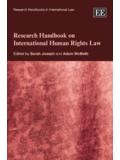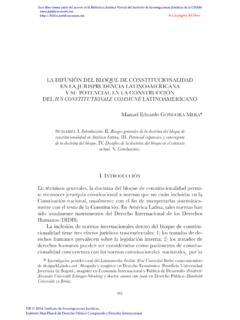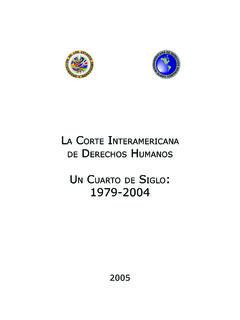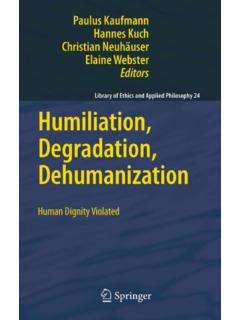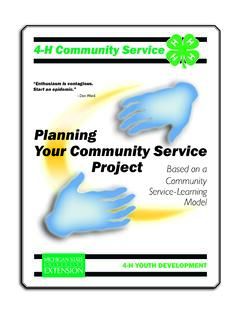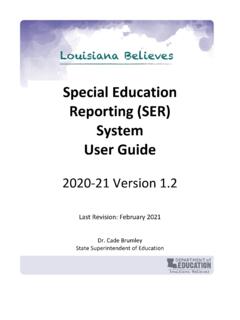Transcription of Inter-American Court of Human Rights Case of the Saramaka ...
1 Inter-American Court of Human Rights Case of the Saramaka people v. Suriname Judgment of November 28, 2007 (Preliminary Objections, Merits, Reparations, and Costs) In the Case of the Saramaka people , the Inter-American Court of Human Rights (hereinafter the Inter-American Court , the Court , or the Tribunal ), composed of the following judges*: Sergio Garc a-Ram rez, President; Cecilia Medina-Quiroga, Vice-President; Manuel E. Ventura-Robles, Judge; Diego Garc a-Say n, Judge; Leonardo A. Franco, Judge; Margarette May Macaulay, Judge, and Rhadys Abreu-Blondet, Judge; also present, Pablo Saavedra-Alessandri, Registrar, and Emilia Segares-Rodr guez, Deputy Registrar; pursuant to Articles 62(3) and 63(1) of the American Convention on Human Rights (hereinafter the Convention or the American Convention ) and Articles 29, 31, 37, 56 and 58 of the Court s Rules of Procedure (hereinafter the Rules of Procedure ), delivers the present Judgment.
2 I INTRODUCTION OF THE CASE AND SUBJECT OF THE DISPUTE 1. On June 23, 2006, in accordance with the provisions of Articles 50 and 61 of the American Convention, the Inter-American Commission on Human Rights (hereinafter the Commission or the Inter-American Commission ) submitted an application to the Court against the State of Suriname (hereinafter the State or Suriname ). The application originated from petition No. presented to the Secretariat of the Commission on * Ad hoc Judge Alwin Rene Baarh informed the Tribunal that, for reasons of force majeur, he could not be present during the deliberation of the present Judgment.
3 2 October 27, 2000 by the Association of Saramaka Authorities (hereinafter ASA ) and twelve Saramaka captains on their own behalf as well as on behalf of the Saramaka people of the Upper Suriname River. On March 2, 2006, the Commission adopted admissibility and merits report No. 9/06, pursuant to Article 50 of the Convention,1 in which it made certain recommendations to the State. On June 19, 2006, the Commission concluded that the matter had not been settled and, consequently, submitted this case to the jurisdiction of the 2.
4 The application submits to the Court 's jurisdiction alleged violations committed by the State against the members of the Saramaka people , an allegedly tribal community living in the Upper Suriname River region. The Commission alleged that the State has not adopted effective measures to recognize their right to the use and enjoyment of the territory they have traditionally occupied and used, that the State has allegedly violated the right to judicial protection to the detriment of such people by not providing them effective access to justice for the protection of their fundamental Rights , particularly the right to own property in accordance with their communal traditions.
5 And that the State has allegedly failed to adopt domestic legal provisions in order to ensure and guarantee such Rights to the Saramakas. 3. The Commission asked the Court to determine the international responsibility of the State for the violation of Articles 21 (Right to Property) and 25 (Right to Judicial Protection), in conjunction with Articles 1(1) and 2 of the American Convention. Furthermore, the Commission requested that the Court order the State to adopt several monetary and non-monetary reparation measures.
6 4. The representatives of the alleged victims, namely, Mr. Fergus MacKay, of the Forest Peoples Programme, Mr. David Padilla, and the Association of Saramaka Authorities (hereinafter the representatives ), submitted their written brief containing pleadings, motions and evidence (hereinafter representatives brief ), in accordance with Article 23 of the Rules of Procedure. The representatives asked the Court to declare that the State had violated the same Rights alleged by the Commission, and additionally alleged that the State had violated Article 3 (Right to Juridical Personality) of the Convention by failing to recognize the legal personality of the Saramaka people .
7 Moreover, the representatives submitted additional facts and arguments regarding the alleged ongoing and continuous effects associated with the construction of a hydroelectric dam in the 1960s that allegedly flooded traditional Saramaka territory. Additionally, they requested certain measures of reparation and the reimbursement of the costs and expenses incurred in processing the case at the national level and before the international proceedings. 1 In the report, the Commission concluded that the State was responsible for the violation of: the right to property established in Article 21 of the American Convention to the detriment of the Saramaka people , by not adopting effective measures to recognize its communal property right to the lands it has traditionally occupied and used, without prejudice to other tribal and indigenous communities.
8 The right to judicial protection enshrined in Article 25 of the American Convention, to the detriment of the Saramaka people , by not providing them effective access to justice for the protection of their fundamental Rights , and Articles 1 and 2 of the Convention by failing to recognize or give effect to the collective Rights of the Saramaka people to their lands and territories. In addition, the Commission made some recommendations to the State of Suriname. Cf. Inter-American Commission on Human Rights , Report N 09/06, Admissibility and Merits.
9 Case The Twelve Saramaka Clans (LOS). Suriname. March 02, 2006 (case file of appendices to the application and annex 1, appendix 1, folios 239-297). 2 The Commission appointed Paolo Carozza, Commissioner, and Santiago A. Canton, Executive Secretary, as delegates, and Ariel E. Dulitzky, V ctor Madrigal Borloz, Oliver Sobers and Manuela Cuvi Rodr guez, as legal advisers. 3 5. The State submitted its brief containing the answer to the application and observations to the representatives brief (hereinafter answer to the application ), in which it alleged it is not responsible for the violation of the right to property established in [A]rticle 21 of the Convention, because the State does recognize the Saramaka community [a privilege to the land it] has traditionally occupied and used[.]
10 ] the right to judicial protection has not been violated, because the Surinamese legislation does provide effective legal recourse[, and] the State [..] has complied with its obligation under [A]rticle 1 and [A]rticle 2 of the Convention and therefore not violated these Rights . Furthermore, the State submitted several preliminary objections, which the Court has divided into the following categories: legal standing of the original petitioners before the Commission, legal standing of the representatives before the Court , non-exhaustion of domestic remedies, duplication of international procedures, and the Commission s lack of standing to bring this particular [case] before [the] Court .
